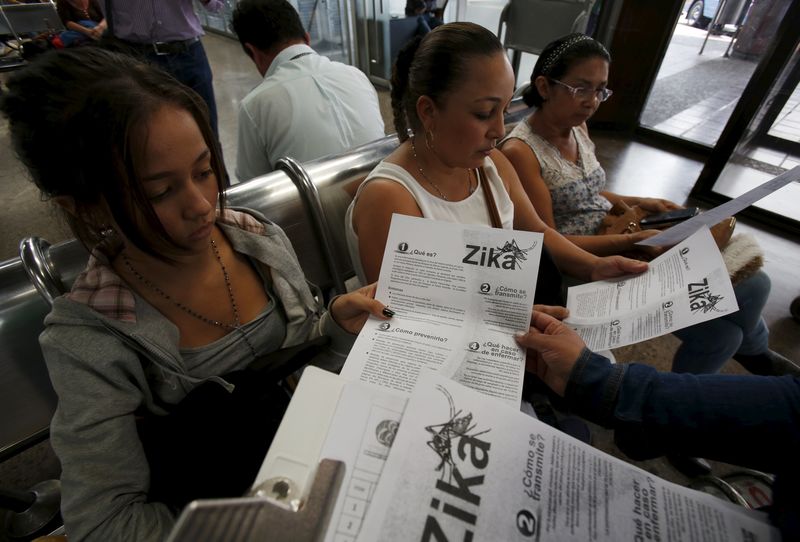By Roberta Rampton and Ben Hirschler
WASHINGTON/LONDON (Reuters) - President Barack Obama will ask the U.S. Congress for more than $1.8 billion (£1.2 billion) in emergency funds to fight Zika at home and abroad and pursue a vaccine, the White House said on Monday, but Obama also said there was no reason to panic over the mosquito-borne virus.
Zika, spreading rapidly in South and Central America and the Caribbean, has been linked to severe birth defects in Brazil and public health officials' concern is focused on pregnant women and women who may become pregnant.
Obama's request to Congress includes $200 million for research, development and commercialization of new vaccines and diagnostic tests for the virus.
In addition, the London-based European Medicines Agency (EMA), Europe's drugs regulator, said it has formed a task force on Zika to advise companies working on vaccines and medicines against the virus.
There are no vaccines or treatment for Zika and none even undergoing clinical studies, as the disease had previously been viewed as relatively benign. Most infected people either have no symptoms or develop mild ones like a fever and skin rashes.
"The good news is this is not like Ebola, people don't die of Zika. A lot of people get it and don't even know that they have it," Obama told CBS News in an interview aired on Monday. "But there shouldn't be panic on this. This is not something where people are going to die from it. It is something we have to take seriously."
In a separate White House briefing on Monday, senior U.S. health official Anthony Fauci said he was not expecting a large-scale Zika infection in the continental United States. He said a widely available vaccine would not be ready for a few years.
"We have already started to develop the vaccine in the early stages and we can predict that we likely would be in phase 1 trial - just to determine if it's safe and if it induces a good response - probably by the end of the summer and get that going by the end of this year," Fauci, director of the National Institute of Allergy and Infectious Diseases, told reporters.
Scientists are working to find out if there is a causal link between Zika and babies born with microcephaly, meaning they have abnormally small heads and can suffer developmental problems. The research began after a huge rise in such birth defects last year in Brazil at the same time the virus took hold there.
Most of the money sought by Obama, who faces pressure from Republicans and some fellow Democrats to act decisively on Zika, would be spent in the United States on testing, surveillance and response in affected areas.
"As spring and summer approach, bringing with them larger and more active mosquito populations, we must be fully prepared to mitigate and quickly address local transmission within the continental U.S., particularly in the Southern United States," the White House said in a statement.
Obama's funding request to Congress also includes $335 million for the U.S. Agency for International Development to support mosquito-control, maternal health and other Zika-related public health efforts in affected countries in the Americas.
There have been 50 confirmed cases of Zika in the continental United States among people who had travelled to affected areas, according to federal health officials.
The White House said it would ask for $250 million for Puerto Rico, the fiscally struggling Caribbean U.S. territory. Zika is actively being transmitted in Puerto Rico and other warmer territories.
MICROCEPHALY CONCERNS
Brazil, the country hardest hit by Zika, has estimated that up to 1.5 million people have been infected in the country. Brazil is investigating more than 4,000 suspected cases of microcephaly. The World Health Organization has said a causal link between Zika and microcephaly is strongly suspected.
Word that Zika can be spread by sexual transmission and blood transfusions and its discovery in saliva and urine of infected people have added to concern over the virus.
Several biotech and pharmaceutical companies are racing to develop a Zika vaccine, including France's Sanofi (PA:SASY), which already has vaccine for the similar condition of dengue.
But scientists know relatively little about Zika and the road to developing a preventative shot is strewn with hurdles.
Brazil is grappling with the virus even as it prepares to host the Olympic Games in Rio de Janeiro in August, with tens of thousands of athletes and tourists anticipated.
The U.S. Olympic Committee has told U.S. sports federations that athletes and staff concerned about their health due to Zika should consider not going to the Olympics.
The message was delivered in a conference call involving USOC officials and leaders of U.S. sports federations in late January. The federations were told that no one should go to Brazil "if they don't feel comfortable going," said Donald Anthony, president and board chairman of USA Fencing.
"One of the things that they immediately said was, especially for women that may be pregnant or even thinking of getting pregnant, that whether you are scheduled to go to Rio or no, that you shouldn't go," said Anthony, a former Olympian.
At the White House on Monday, Fauci said athletes would need to make a personal decision about whether or not to skip the Olympics.
The U.S. Centers for Disease Control and Prevention has advised pregnant women to avoid travel to areas with an active outbreak of Zika. CDC principal deputy director Anne Schuchat told the briefing that as for Americans travelling to areas with Zika, "we don't think that needs to stop."
"Right now our focus is on protecting pregnant women and trying to control the mosquito," she said.

The WHO last week declared an international emergency over the disease, estimating that up to 4 million people may become infected in the Americas.
